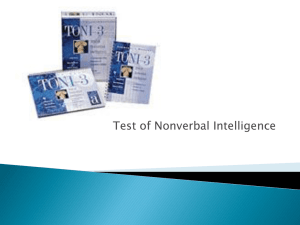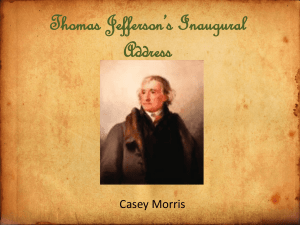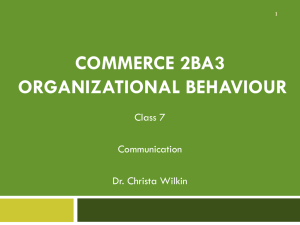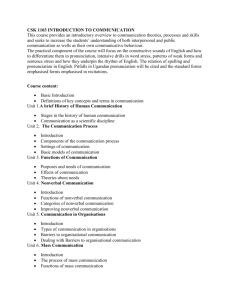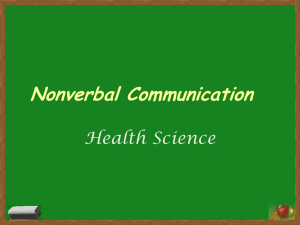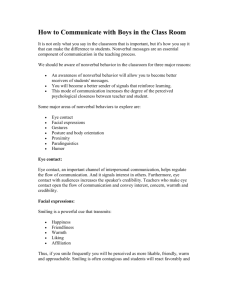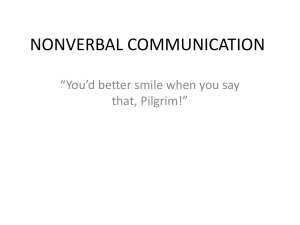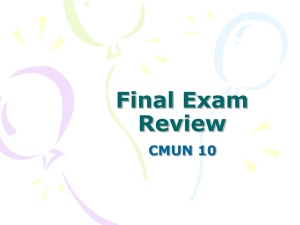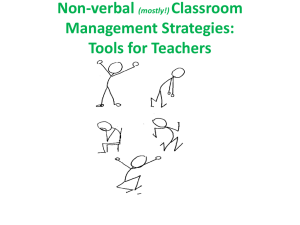InfT6021
advertisement
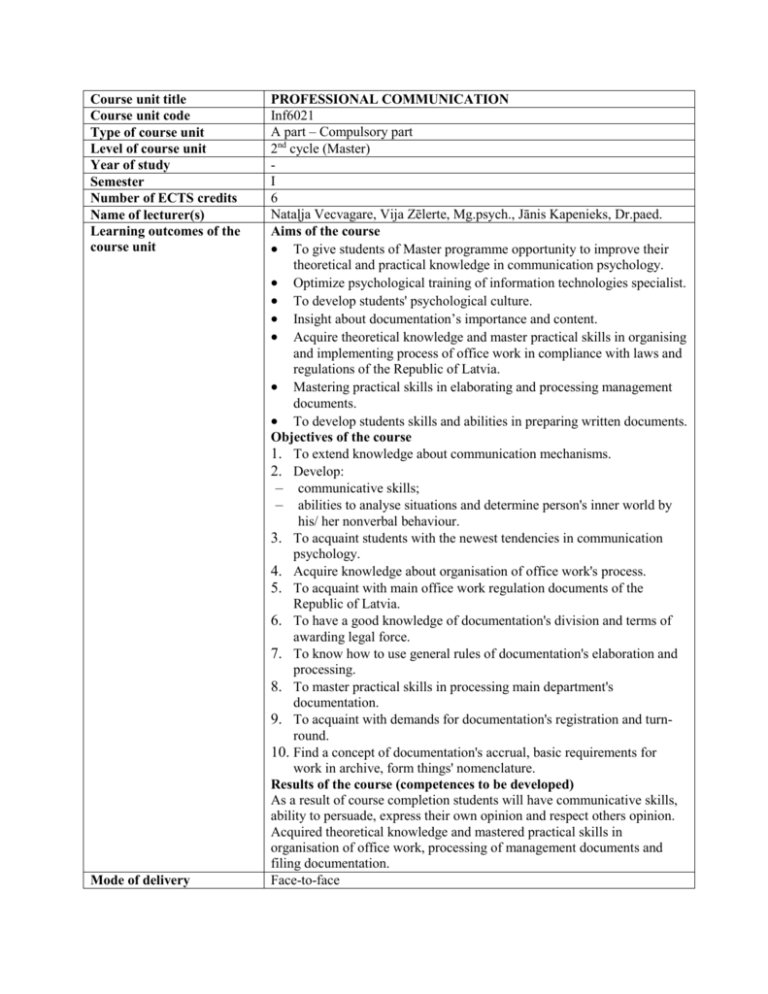
Course unit title Course unit code Type of course unit Level of course unit Year of study Semester Number of ECTS credits Name of lecturer(s) Learning outcomes of the course unit Mode of delivery PROFESSIONAL COMMUNICATION Inf6021 A part – Compulsory part 2nd cycle (Master) I 6 Nataļja Vecvagare, Vija Zēlerte, Mg.psych., Jānis Kapenieks, Dr.paed. Aims of the course To give students of Master programme opportunity to improve their theoretical and practical knowledge in communication psychology. Optimize psychological training of information technologies specialist. To develop students' psychological culture. Insight about documentation’s importance and content. Acquire theoretical knowledge and master practical skills in organising and implementing process of office work in compliance with laws and regulations of the Republic of Latvia. Mastering practical skills in elaborating and processing management documents. To develop students skills and abilities in preparing written documents. Objectives of the course 1. To extend knowledge about communication mechanisms. 2. Develop: – communicative skills; – abilities to analyse situations and determine person's inner world by his/ her nonverbal behaviour. 3. To acquaint students with the newest tendencies in communication psychology. 4. Acquire knowledge about organisation of office work's process. 5. To acquaint with main office work regulation documents of the Republic of Latvia. 6. To have a good knowledge of documentation's division and terms of awarding legal force. 7. To know how to use general rules of documentation's elaboration and processing. 8. To master practical skills in processing main department's documentation. 9. To acquaint with demands for documentation's registration and turnround. 10. Find a concept of documentation's accrual, basic requirements for work in archive, form things' nomenclature. Results of the course (competences to be developed) As a result of course completion students will have communicative skills, ability to persuade, express their own opinion and respect others opinion. Acquired theoretical knowledge and mastered practical skills in organisation of office work, processing of management documents and filing documentation. Face-to-face Prerequisites and corequisites Recommended optional programme components Course contents Course plan Characteristic of communication, communication "man - man", "man machine" and its individuality, persuasion's method in professional communication. Verbal and nonverbal communication. Students are acquainted with process of organising office work, requirements for processing documentation and regulations for normative documentation, basics of computer-based office work and notion of electronic documentation, nomenclature and documentation keeping. Practical skills are developed in processing management documents. Theme Sub-themes 1. Communication – Notion of communication. Functions psychology as a branch of of communication. Structure of psychology and a part of communication: Communication social psychology. – Communication as interaction. Description of Communication as social perception. communication, Types of communication – Barriers of communication. Communication and basic human needs. Nowadays communication. Communication "man - man", and "man machine". 2. Persuasion's method in Persuasion rules. Persuasion scheme: attention, interests, communication desire and activities. Usage of persuasion's method in professional process 3. Verbal communication. Language and speech. Verbal communication's resources. Types of speech. Language functions in communication. Communication and personality. Communication technique in conversation. Conversation stages 4. Nonverbal communication. Notions of nonverbal communication, of appearance and nonverbal behaviour. Substance of nonverbal communication. Components of appearance. Means of nonverbal communication. 5. Human expression Gestures, facial expression, pose, tone; their interpretation and importance in mutual communication. 6. Social psychological interpretation of a person Structure and algorithms of interpretation. 7. Formal or business-like communication. 8. Conflict regulating communication 1. Notion of office work 2. Office work's service, office work's organisation 3. Documentation, its legal substantiation 4. Technical terms for elaboration of management Specialist’s nonverbal behaviour, its functions. How correctly arrange furniture in a room and how to make people sit down for formal conversation. Individuality of nonverbal behaviour, which inconveniences formal communication. Forms of formal conversation. Rules how to prepare for formal communication. Factors of social psychological difficulties, which cause difficulties in formal communication. Conflict as one of effective communication forms. Types of conflict. Methods of conflict's solution, which are used in professional action. Problem situations. Behaviour tactics in problem situations. 1.1. Substance and importance of office work in management activities. 1.2. Main office work regulating normative documentation. 1.3. Recommended reading and resources. 2.1. Documentation of establishment's activities and notion of work with documentation. 2.1. Organisation forms of procedure of office work. 2.3. Main conditions for organising procedure of office work in establishments. 3.1. Fixing of establishment's activities. 3.2. Interpretation of documentation's notion in the narrow and wide sense. 3.3. Systems of extensive used documentation and their features. 3.4. Demands for awarding legal force for documentation. 3.5. Electronic documentation and digital signature. 3.6. Documentation's division by different indications: by type, by progress, by stage of preparation, by activity and storage life, by level of publicity and other features. documents 5. Text of documents 6. Document's requisites and official marks, demands for their processing 7. Management documents 8. Organisation of work and documentation 9. Sorting and processing of documents for further keeping 1. module. Introduction to Technical Writing 2. module. Technical Writing Process 4.1. Paper format, margins, font size, line spacing etc. 4.2. Usage of colours and hardware, font style, emphasis. 5.1. Classification of documentation's text and regulations for forming the text. 5.2. Formal language style, its main principles and features. 6.1. Requisites with legal importance in all or separate type of documents. 6.2. Requisites with legal subsidiary function. 6.3. Requisites confirming exactness of documents' original derivative. 6.4. Official marks used in documents. 7.1. Processing of managerial documentation. 7.2. Processing of administrative documentation. 7.3. Processing of information and account documents. 7.4. Correspondence documents or transaction documents, their processing. 7.5. Processing personnel's documentation. 8.1. Documents' accounting, registration, preparation, sending. 8.1. Organisation of documentation's turn-round and check of fulfilment. 9.1. Types, tasks and main functions of archive. 9.2. Regulations for institutions archive activities. 9.3. Nomenclature. 9.4. File formation. 1.1 Introduction in professional writing 1.2 Ethics 1.3 Readability 1.4 Style 1.5 Pictures 1.6 Design 2.1. Introduction in process of professional writing 2.2. Defining of tasks Recommended or required reading Planned learning activities and teaching methods Assessment methods and criteria Language of instruction Work placement(s) 2.3. Organisation and choice of main tasks 2.4. Examination 2.5. Preparation of presentation's copy 3. module. Instruction 3.1. Defining of tasks 3.2. Description of mechanism 3.3. Instructions 3.4. Description of procedure and process 3.5. Summary 4. module. Reports 4.1. Introduction in writing reports 4.2. Content of reports 4.3. Writing formal report: content of report 4.4. Writing formal report: appendices 5. module. Communication 5.1. Memo 5.2. Letters 5.3. Format of letter Lambert D.and K. Bodu Language.London,2004 AdlerR.B., L.B. Rossenfeld, R.E.Proctor.(2001) Interplay. The Process of Communication. Hartcourt College publishers. Applications of nonverbal communication / e.dited by Ronald E. Riggio, Robert S. Feldman. - Mahwah, N.J. : L. Erlbaum Associates, 2005. - xv, 310 p. Fisher,B.A.,&Adams.K.(1994)Interpersonalcommunication:Pragmatics of human relationships(2end ed.).New York:Random Hous. Gayle Wiebe Oudeh& Nabil Oudech.(2006) Conflict is for the birds: understanding your conflict management style. CCR International Publishing Inc. Lencioni ,P. (2002)The five dysfunctions of a team : a leadership fable.Wiley Company. Powell Trevor, Dr. (2000) Stress Free Living. - Dorling Kindersley Limited, London. Smith L., Mounter P. (2008) Effective Internal Communication (PR In Practice).Kogan Page Limited. Journal of Applied Psychology Lectures, practical works, seminars, student's individual work Exam 1. Acquired theoretical knowledge, active participation in practical classes. 2. Participation in theoretical and practical classes. All practical and independent assignments - fulfilled. An essay about tasks and aims of archive activities. Fulfilment of self-appraisal test for testing theoretical knowledge and practical skills. 3. 2 tests, 3 independent works in the Internet class and final work - To write professional communication documents- report of incident, reclamation, an answer to reclamation, request to appropriate money, informative report about potential customers of the product, project application, complaint, instruction or description of a gadget, formal letter. English N/a
